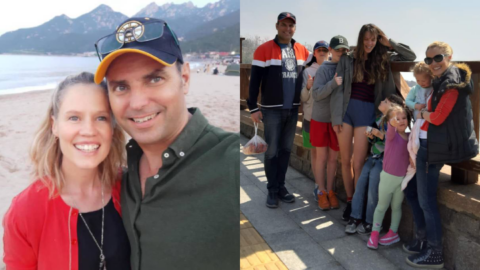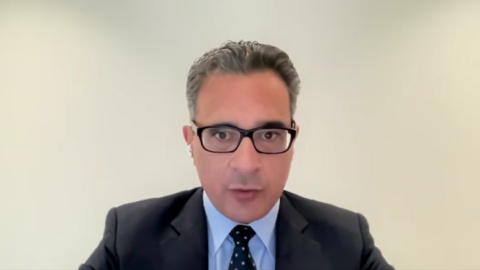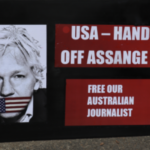Inquiry into Extralegal Nature of Dan Duggan’s US Extradition Warrants Stay, Lawyer Says

The proposition is that former US Marine Corps fighter pilot Daniel Duggan is currently being held in Lithgow Correctional Centre pending extradition to the US, as the Australian citizen was “unlawfully lured” back to this country by ASIO, which was potentially working in cahoots with US intelligence.
The father-of-six is said to have been enticed back to his family home in the NSW town of Orange from China last October, with the promise of obtaining an Australian aviation security ID card, which, in turn, enabled the US to immediately commence extradition proceedings.
Duggan was in China in the capacity of general manager of aviation consultancy AVIBIZ. And the US wants the 54-year-old in relation to a 2017 US District of Columbia grand jury indictment, which alleges he violated arms control law when training Chinese pilots in South Africa early last decade.
The reason why this version of events rings true is that geopolitical tensions in the Indo Pacific region are escalating, and the official scenario, which posits an aggressive China is actively seeking US military operational secrets from a former US marine, primes AUKUS nations in readiness for war.
But according to Dan’s solicitor Dennis Miralis, a number of aspects of the Duggan extradition proceedings warrant a temporary stay, especially as the Inspector General of Intelligence and Security recently announced it’s investigating the legitimacy of the matter.

Intelligence enticement
“Dan continues to suffer acute mental distress in custody and is especially anguished at the impact that his incarceration is having on his six children,” said Miralis during a 20 April press briefing. “In our view, if Dan’s complaint is established, it goes to the very heart of the legality of his extradition.”
“We’ve also been informed by the IGIS that Dan’s complaint… is highly classified,” the lawyer continued. “One aspect… which has been made public is the possibility of his extradition having been founded on unlawful conduct, and we have previously called this “the lure”.
The IGIS announced its formal investigation on 21 March. This followed a four-month preliminary inquiry into complaints made by Duggan last year, following his 21 October arrest and subsequent remanding, which has seen him labelled an “extreme high-risk” inmate and subjected to isolation.
In terms of the ASIO security clearance lure, such actions are illegal under Australian domestic law but not that of the US. And as the 1976 Australia-US extradition treaty doesn’t expressly rule out such a tactic in facilitating extradition, Miralis considers these laws need a complete overhaul.
“As the complaint under investigation by the IGIS, if established, has the ability to directly affect the extradition proceedings, we have requested the US to withdraw its extradition, pending the outcome of the IGIS investigation,” Miralis made clear.

Questions of criminality
Attorney general Mark Dreyfus approved the extradition of Duggan, an Australian citizen since 2012, just prior to Christmas, following the US having requested this on 9 December, the same day the indictment was unsealed, which asserts he’s broken US arms control and money laundering laws.
The claim is that Duggan, who left the US Marines in 2002 after 13 years of service, was involved in a criminal conspiracy with eight others over 2009 to 2012, which sought to export defence services, namely flight training, “to the People’s Republic of China in violation of an arms embargo”.
The move to act on the Trump era indictment coincided with a British push to investigate 36 of its former military pilots for engaging in the decades-old practice of training their Chinese counterparts, while Australian defence minister Richard Marles said he’d consider whether to do the same locally.
Yet, as Greens Senator David Shoebridge explained in March, Dreyfus hasn’t addressed the question of double criminality: an extradition law requirement that the crime an individual is to be extradited over for trial, must similarly be illegal under the law of the nation they’re to be transferred from.
And Miralis told the press on Thursday, that in responding to a submission made to him, the federal attorney general “did not disclose expressly whether or not that issue was considered” prior to his approving the US extradition request in December.
A punishing remand
Duggan has been remanded under the provisions of section 15 of the Extradition Act 1988 (Cth) since October. And similar questions have been raised around the excessive nature of his treatment in prison, as have been made regarding the remanding of Julian Assange in a British gaol.
Initially held in the remand facility at Sydney’s Silverwater Correctional Complex, Duggan, in having been classed as “extreme high-risk” and being held in isolation in a restricted area, has been treated in a similar manner to prisoners detained on terrorism charges.
“We have brought the human rights and rule of law violations in Dan’s case to the attention of the president of the International Commission of Jurists, Mr Nicholas Cowdery KC, who we understand will be writing to NSW Corrective Services about Dan’s custodial situation,” said Miralis.
The lawyer added that his client’s treatment inside “has not improved in anyway”. But in light of the IGIS inquiry, he’ll be entering a request for a temporary stay on proceedings pending the investigation outcome, as well as applying for Duggan’s release on bail.
Cold war mentalities
Shoebridge told Sydney Criminal Lawyers last month that it’s far from coincidental “that the scare campaign about links with China coincides with the Australian government trying to persuade the Australian public to spend hundreds of billions of dollars on US and UK weaponry targeted at China”.
And the senator asserts that Duggan’s case “is a concerted, multilayered political campaign by our government and the US government to persuade the Australian public to divert hundreds of billions… into the global weapons industry and to underpin this fear campaign directed at China”.
The Albanese government recently stunned the nation in announcing, as part of the AUKUS pact, that we’ll be spending $368 billion on nuclear-powered submarines, while the Morrison government committed to $270 billion in acquiring US military equipment over the ten years to 2030.
And the overtly political nature of this case triggers further questions about its legitimacy, as the 1976 extradition treaty stipulates that “extradition shall not be granted”, when it’s proven the request has been made to punish the subject over “an offence of a political character”.
Procedural fairness denied
The case is now set to go before Downing Centre Local Court on 1 May, after it was adjourned for six weeks to allow the defence to attempt to obtain documents, and Miralis has confirmed that if Washington has not withdrawn the matter by then, he’ll request that stay on proceedings.
Since the last hearing, Duggan’s defence has had no success in obtaining key evidence relating to the case, with the Australian Federal Police having refused to hand over 60-odd documents, and two appeals of this decision have been lodged with the Australian Information Commissioner.
“The AFP in refusing us access through their counsel to that material, identified that, in their view, disclosure of that material would prejudice extradition proceedings, a conclusion that they reached after disclosing to us that they had spoken to the US,” Miralis explained.
“Whilst we don’t seek a stay… on the basis of the lack of disclosure and denial of procedural fairness… in relation to the ongoing battles in getting access to documents, it may very well be… a separate ground will be filed on the basis of Dan not being able to defend himself,” the lawyer ended.







